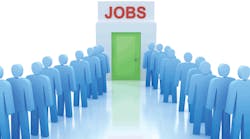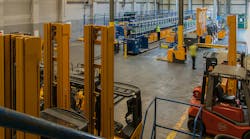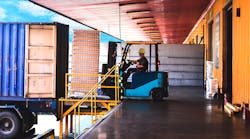We all cringe at the thought of dealing with the IRS. The idea of getting audited ranks right up there with proctology in the category of “things that make your skin crawl.” And with the latest news about the IRS targeting conservative groups for extra scrutiny, that cringe factor may be spiking right now. So maybe it’s that reluctance to call attention to themselves that keeps people from taking credit where a tax credit is due. The propane tax credit is a perfect example.
A 50-cent-per-gallon tax credit for propane and other alternative fuels is available for the taking, yet there are still owners of LPG forklifts that don’t claim it, either because they don’t want to go through a hassle or they just don’t know about it. The deadline for taking the credit is December 31, 2013.
So, there’s still time this year to get what’s coming to you—in a good way—from the IRS. And if you are one of those who didn’t know about this credit, you have until July 1 to claim retroactive credits for those years you didn’t claim it.
I spoke with Randolph Smith about this. He’s national transportation leader with Grant Thornton, the auditing and tax consultancy, and even he’s surprised that more lift truck fleet owners aren’t aware of the money they’re leaving on the table.
“Many companies think, ‘We’ve been using propane, we’re not using more, so the credit must be for those using more,’ when in fact that credit is for 50 cents a gallon regardless of whether you’re using more or less,” he told me. “We’re surprised that even very large companies are unaware. And many aren’t aware they can go back and amend tax returns to take the credit, as long as they’re registered as a user.”
They’re either unaware, or they’re wary of dealing with government agencies altogether. That’s supported by the findings of a Grant Thornton online survey conducted earlier this year measuring in-house counsel’s assessment of their biggest threats to organizational growth. Economic uncertainty topped the list, but “regulatory compliance and enforcement” came in second and was ranked as even more threatening than traditional business concerns such as “global or domestic competition” and the “lack of customer demand.”
So if you didn’t know about the tax credit for propane use, now you do. And if knowing about it doesn’t make you eager to claim it, Smith said there are other ways to take advantage of credits and incentives without worrying about making IRS contact. In fact you can create your own opportunities by working with people at state or local agencies.
“Many states and local governments have money in the pot to attract business and if you ask for it all they can say is no,” he added. All you have to say is, “We’re looking at locating in one of three states, what can you give us?” Smith says all size companies can have that kind of leverage, and they ought to be contacting their advisers to ask about such opportunities.
And if you’d like to restrict opportunities for picking low-hanging fruit to private-sector orchards, you can find such opportunities in your automated material handling systems as well. For example, I spoke recently with Mark Sibley, director of customer support for the Beumer Group, about the idea of refurbishing material handling systems and he says that in times of economic uncertainty many companies try to get more production out of existing systems as opposed to spending $60-90 million and starting from scratch.
“This is driven very hard by the electrical controls aspects,” he told me. “Systems that were installed with serial connections and old PLCs and componentry are obsolete, and sometimes their migration path because of the OEM involved is uncertain.So If you’re going to look at [refurbishing], you might as well add in some additional functions, tools, operations. As with a car, when you have the hood open, it pays to change the water pump at the same time you’re doing the radiator.”
Sibley offers the example of going to linear drives, which use less power. This can be seen as a sustainability measure, but it’s also a good way to save money.
“Power management systems can make sure you limit your peak, because most of our industrial and commercial customers get charged electricity-wise on two elements: kilowatt hours consumed and peak demand. Sustainability measures are cost driven from the point that savings and reduction of maintenance provide additional justification for organizations to take these steps that they would otherwise not do. It becomes another part of the justification to move forward with system enhancements and modifications.
Enhancements often entail turning dumb systems into smart ones. Sibley says he worked with a customer that had a system dating back to the mid 90s. It didn’t provide a lot of feedback to their WMS. This company decided they wanted as much information as they could get about when waves start, when parcels start to drop and when fulfillment is finished. They want actionable information for the people who can take action.
“There’s a more intimate understanding within our customer organizations of what ails them, and what they need to make their business better and more profitable,” Sibley said. “They seem to be closer to the floor as far as their intimacy and knowledge of what’s going on instead of leaving it to a corporate systems person. The people we end up dealing with now are a lot closer to the process—the day to day. They’re aware of the pain points that can’t be aggregated into some flow chart.”
So my point in going through all this is, there are many opportunities to get more ROI out of your existing assets, from lift trucks to automated systems. Working with someone from a material handling equipment manufacturer is a no-brainer. Their future is tied to your success. Working with a government bureaucrat? Well, the IRS can use a few kind words right now, so maybe if you give them some credit for being public servants they’ll extend you some credit for your energy efficient material handling.



